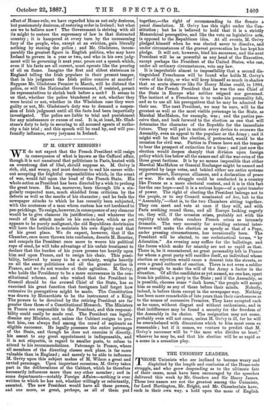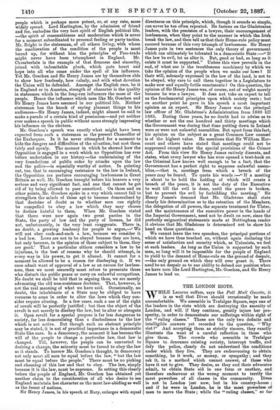THE UNIONIST LEADERS.
TUnionists who are inclined to become weary and dispirited by the length and confusion of the Home-rule struggle, and who grow desponding as to the ultimate fate of their cause, must have been encouraged by the speeches delivered this week by Mr. Goschen and Sir Henry James. These two names are not the greatest among the Unionists, for Lord Hartington, Mr. Bright, and Mr. Chamberlain have, each in their own way, a hold upon the masa of English people which is perhaps more potent, or, at any rate, more widely spread. Lord Harrington, by the admission of friend and foe, embodies the very best spirit of English political life, —the spirit of reasonableness and moderation which is never for a moment subordinated to personal feeling or party tactics. Mr. Bright is the statesman, of all others living, with whom the amelioration of the condition of the people is most bound up, for without him the principles of Free-trade might never have been triumphant in England. Mr. Chamberlain is the example of that firmness and sincerity, joined with indomitable pluck, which puts heart and hope into all who come under the spell of his influence. Yet Mr. Goschen and Sir Henry James are by themselves able to show how fearlessly, how calmly, and with what devotion the Union will be defended. Amongst the English race, be it in England or in America, strength of character is the quality in statesmen which in the long-ran influences the mass of the people. Hence the influence which men like Mr. Goschen and Sir Henry James have assumed in our political life. Neither statesman has the knack of saying pleasant things to his audiences—Sir Henry James, indeed, might almost be said to make a parade of a certain kind of pessimism—and yet neither ever makes a speech in public without more strongly impressing his influence on the electors.
Mr. Goschen's speech was exactly what might have been expected from such a statesman as the present Chancellor of the Exchequer. In it he never attempted for a moment to hide the dangers and difficulties of the situation, but met them fairly and openly. The manner in which he showed how the Opposition is engaged in a work which no Opposition has ever before undertaken in our history—the undermining of the very foundations of public order by attacks upon the law and the police—is especially worthy of notice. In pointing out, too, that in encouraging resistance to the law in Ireland, the Opposition are perforce encouraging lawlessness in Great Britain as well, Mr. Goschen brought before his hearers a very serious and very significant fact, and one that cannot be got rid of by being allowed to pass unnoticed. On these and on other points, Mr. Goschen spoke in a way which cannot fail to strengthen the minds of those apt to become demoralised by that doctrine of doubt as to whether men can rightly be compelled to obey a law which they may choose to declare hateful to them. When Mr. Goschen stated that there were now again two great parties in the State, the party of law and the party of license, he did not, unfortunately, in the very least exaggerate. There ie, no doubt, a growing tendency for people to argue,' We will not obey such-and-such a law, because we consider it a bad law. Laws are not to be obeyed because they are laws, but only because, in the opinion of those subject to them, they are good.' That a particular citizen considers a law to be injurious, is the best of reasons why he should attempt, in every way in his power, to get it altered. It cannot for a moment be allowed to be a reason for disobeying it. H we once admit want of approval of a law as an excuse for lawless- ness, then we most assuredly must refuse to prosecute those who disturb the public peace or carry on unlawful occupations. No doubt we shall be told that in arguing thus, we are merely advocating the old non-resistance doctrine. That, however, is not the real meaning of what we have said. Occasionally, no doubt, the inhabitants of a State may be obliged to have recourse to arms in order to alter the laws which they con- sider require altering. In a few cases, such a use of the right of revolt will be perfectly justified ; but then the object of the revolt is not merely to disobey the law, but to alter or abrogate it. Open revolt for a special purpose is far less dangerous to society, far less demoralising than a disobedience to the law which is not active. But though such an abstract principle may be stated, it is not of practical importance in a democratic State like ours. In a democracy, the moment it has become the will of the people to change a particular law, that law is changed. Till, however, the people can be converted to desiring a change, the minority must be forced to obey the law as it stands. To borrow Mr. Goschen's thought, in democracy not only must all men be equal before the law, " but the law must be equal before the people." There most be no picking and choosing of this law and that to obey. The law, simply because it is the law, must be supreme. In setting this clearly before the people of England, Mr. Goschen has obtained yet another claim to the consideration of all who desire to see England maintain her character as the most law-abiding as well as the freest of nations.
Sir Henry James, in his speech at Bury, enlarges with equal directness on this principle, which, though it sounds so simple, can never be too often repeated. He fastens on the Gladatonian leaders, with the precision of a lawyer, their encouragement of lawlessness, when they point to the manner in which the Irish break the law, and then tell us that their Home-rule policy must succeed because of this very triumph of lawlessness. Sir Henry James puts in two sentences the only theory of government which can ultimately be tolerated in a democratic State :—" If the law be evil, let us alter it. But, good or bad, so long as it exists it must be supported." Unless this view prevails in the end, of what use is the troublesome machinery by which we take the opinion of the people when we make our laws V If their will, solemnly expressed in the law of the land, is not to be obeyed, why care to call them together in a Legislature to make new and equally futile enactments 1 On this question, the opinion of Sir Henry James was, of course, not of weight merely because he was a lawyer. It does not take an expert to tell us the fundamental principles upon which society rests ; but on another point he gave in his speech a most important opinion as an expert. Sir Henry James was the principal law officer of Mr. Gladstone's Administration from 1880 till 1885. During those years, he no doubt had to advise as to whether or not the one hundred and thirty meetings which the Government was during that time putting down in Ireland were or were not unlawful assemblies. But apart from this fact, his opinion on the subject as a great Common Law counsel is of the highest value. He mentions that Sir William Har- court and others have stated that meetings could not be suppressed except under the special provisions of the Crimes Act. From this view Sir Henry James entirely dissents, and states, what every lawyer who has ever opened a text-book on the Criminal Law knows well enough to be a fact, that the Government has a perfect right to suppress unlawful assem- blies,—that is, meetings from which a breach of the peace may be feared. To quote his words :—" If a meeting is about to be held the holding of which will create a breach of the peace, it is not the duty of the Executive to wait till the evil is done, until the peace is broken, but to prevent the evil by forbidding the meeting." Sir Henry James's demand that Mr. Gladstone shall state clearly his determination as to the retention of the Members, the delegation of all powers, the separate treatment for Ulster, and the maintenance of the executive power in the hands of the Imperial Government, need not be dwelt on now, since the perfectly enigmatical statements made at Nottingham render it obvious that Mr. Gladstone is determined not to show his hand on these questions.
We cannot leave the two speeches, the principal portions of which we have thus touched on, without again declaring the sense of satisfaction and security which, as Unionists, we feel at such leaders. As long as the Union is supported by such men, so long will it be impossible for the people of England to yield to the demand of Home-rule on the ground of despair, —the only ground on which they will ever grant it. There need be no despair as to our ability to defend our position when we have men like Lord Harrington, Mr. Goschen, and Sir Henry James to lead us.







































 Previous page
Previous page